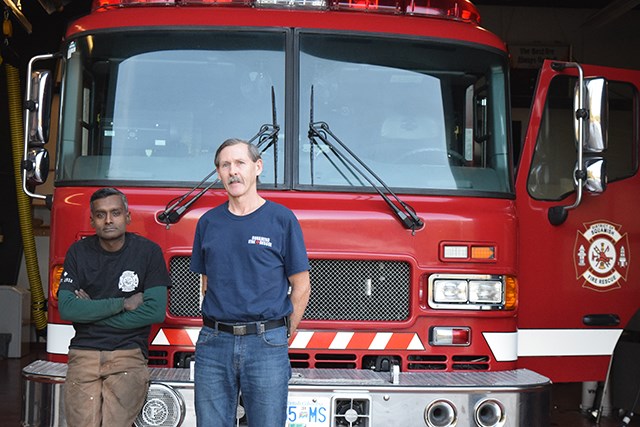The very definition of their job involves putting aside their feelings and needs to help others, but sometimes, the helpers need support too.
Firefighters suffer from post-traumatic stress disorder (PTSD) at rates similar to those found in combat veterans, according to a report released by the International Association of Fire Fighters in 2016. About seven percent of the general population will suffer from PTSD in their lifetime, according to the National Centre for PTSD. About 17 per cent of Canadian firefighters suffer from the sometimes-debilitating mental illness.
Squamish Fire Rescue has a program, Critical Incident Stress Management, that helps its members deal with the trauma they face in the course of their work.
Any call that is unusually stressful or involves a fatality results in a debrief with the members involved, led by five Fire Rescue members who have formal training in dealing with PTSD, including volunteer firefighter Neil Deo.
In the first 24 hours after an incident, the trained members make phone calls to everyone involved in the call, Deo said.
Within a few days there is a debrief.
“Members have to come in, we sit in a circle and there’s a series of questions we ask that gets your thought process going to be able to cope,” Deo explained.
Fire fighters learn to watch out for each other to spot the signs of mental distress in each other.
The program has been in place for about six years.
The goal is to make talking about mental health as common as putting on their jackets and helmets, Deo said.
It can be hard for fire fighters to ask for help, Deo acknowledged, because they are the ones others lean on in times of trouble.
Squamish Fire Rescue volunteer David Gillis, a graduate and instructor of
Langara College’s Strategic Resilience for First Responders certificate program agrees.
“It isn’t normal for us,” Gillis said. The Squamish program tries to normalize self care, though the program doesn’t provide treatment, Gillis stressed. “We are simply trying to provide a variety of mind-body and whole-person practices and experiences that we hope will help build resilience to repeated trauma exposure for our firefighters and first responders,” he said.
Access to professional counselling is readily available for members, Gillis added.
Both Gillis and Deo have experienced PTSD as a result of being first responders. For Deo, it was a routine call to a car accident that impacted him. In particular, it was seeing the car’s engine parts spread out across the road and the vehicles fluids leaking out that stuck with him.
Every person is impacted differently by what they see or experience on a call, both men explained. People can be triggered by a call that relates to their own childhood traumas, after a certain type of call or cumulatively as a result of repeated trauma.
Because Deo is a mechanic by trade, the scene with the car parts stuck with him.
“Every time I work on a transmission now, that is the first thing I think of, is that accident. That impact must have been so great for those gears to be spread all over the highway,” he said. “At the time [of the accident] I wasn’t thinking of that… I didn’t have a chance to process it all. It started coming up later on.”
Like many who experience trauma and its aftermath, Deo, who has a wife and three daughters, used to want to isolate himself when he had a bad call.
He would sit in the car in the driveway outside his house and not come in until his girls were asleep.
“It is hard to process what you have just seen, and come home and be a dad,” he said.
But he has learned that isolation is the disorder’s friend. To combat it, he needs to express what he is thinking and feeling.
“Now, I can walk in the door and still be a dad and talk to my family about it,” he said.
PTSD is a mind and body injury, Gillis said.
The Squamish program is expanding to include yoga and art classes to help firefighters holistically.
Deo said while the first yoga session — that is specifically designed for first responders who deal with trauma — there were three members in attendance, that number has recently increased to about 10.
While the attitude used to be that fire fighters, and men in general, should “suck it up and take it,” when things get tough, that attitude has changed in the Squamish fire halls, according to Deo.
Fire Rescue Chief Bill Stoner credits Deo, Gillis and others involved in the program with helping to shift firefighter culture in Squamish to, “where it is OK to talk about mental health challenges,” Stoner told The Chief.
“There are many situations where members of Squamish Fire have acted selflessly for their brothers and sisters on the department. The drive to create a proactive approach to firefighter mental health is one of the most powerful illustrations of this selflessness that I can think of.”
For anyone experiencing PTSD, the condition is treatable. Seek help by contacting a family physician or mental health professional who has experience treating trauma.
Symptoms of PTSD
1) intrusive symptoms such as having unwanted thoughts, dreams, memories, feelings, and physical reactions related to the traumatic experience;
2) avoidance symptoms such as efforts to avoid memories, thoughts, feelings or other reminders of the traumatic experience;
3) changes in mood and thoughts related to the traumatic event; and
4) changes in reactivity, such as an increase in irritability, recklessness or self-destructive behaviour, poor concentration, or strong startle response.



